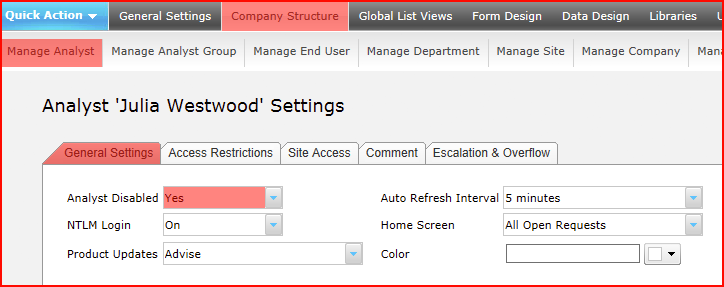Layton ServiceDesk - FAQ - User Deletion
m (Jpainter moved page User Deletion FAQ to User Deletion without leaving a redirect: Remove "FAQ" suffix) |
m (Added a step to click the Save button) |
||
| (12 intermediate revisions by one user not shown) | |||
| Line 1: | Line 1: | ||
| − | If an Analyst leaves your company or department they are very likely to have requests associated | + | <p align="right">[[File:btn_back_up.png|link=User Guide for Layton ServiceDesk™]] [[User Guide for Layton ServiceDesk™|<u>Back to Contents</u>]]</p> |
| − | + | __FORCETOC__ | |
| − | However, you | + | =Overview= |
| − | *Please note that the menu items named below may appear differently if your Application Terms have been changed. | + | If an Analyst leaves your company or department they are very likely to still have requests associated with them. By design, to preserve database integrity, an Analyst user record cannot be deleted unless all requests and other data referenced to their username is deleted or modified. |
| − | = | + | |
| − | #Log in as an Administrator-level User | + | It is unlikely that you would want to delete historical records just to remove any reference to an absent Analyst. In time, regular '''[[Layton ServiceDesk™ - Utilities - Purging|Purging]]''' will remove the final links to the username and the Analyst record can be deleted. However, in the meantime, it is anticipated that you might want to see the Analyst's past involvement in service-desk operations. |
| − | # | + | |
| − | #Click the 'Settings' | + | What you don't want is this Analyst appearing in any dialog where an Analyst can be selected. They should only appear in the context of past Requests and should otherwise be invisible. Additionally, if you have licensed Layton ServiceDesk by Analyst, they are consuming a licence that they aren't using. |
| − | #In the General Settings tab, change the Analyst Disabled setting to 'Yes' | + | |
| − | <br/> | + | We have a mechanism that |
| − | + | *Protects the links in past Requests | |
| − | < | + | *Makes an Analyst invisible to current activity |
| − | = | + | *Gives you the Analyst licence back. |
| − | #Log in as an Administrator-level User | + | |
| − | # | + | Instead of ''deleting'', we ''disable''. |
| − | # | + | |
| + | The above also applies to End Users. | ||
| + | |||
| + | Please note that the menu items named below may appear differently if your '''[[Layton ServiceDesk™ - Settings - System Settings - Application Terms|Application Terms]]''' have been changed. | ||
| + | |||
| + | =Disabling an Analyst= | ||
| + | #Log in as an Administrator-level User. | ||
| + | #Go to ''Administration > Company Structure > Manage Analyst''. | ||
| + | #Click the ''Settings'' button [[File:Lsd btn edit 16px.png|link=]] for the Analyst to be disabled. | ||
| + | #In the ''General Settings'' tab, change the ''Analyst Disabled'' setting to ''Yes''.<br /><p>[[File:Lsd disable analyst01.png|link=]]</p> | ||
| + | #Click the Save button [[File:Lsd btn save.png|link=]]. | ||
| + | <p align="right">[[File:btn_back_up.png|link=User Guide for Layton ServiceDesk™]] [[User Guide for Layton ServiceDesk™|<u>Back to Contents</u>]]</p> | ||
| + | |||
| + | =Disabling an End User= | ||
| + | #Log in as an Administrator-level User. | ||
| + | #Go to ''Administration > Company Structure > Manage End User''. | ||
| + | #Check the ''Disable'' check box for the End User to be disabled.<br /><p>[[File:Lsd disable euser01.png|link=]]</p> | ||
| + | <p align="right">[[File:btn_back_up.png|link=User Guide for Layton ServiceDesk™]] [[User Guide for Layton ServiceDesk™|<u>Back to Contents</u>]]</p> | ||
Latest revision as of 21:59, 1 January 2019
Contents |
[edit] Overview
If an Analyst leaves your company or department they are very likely to still have requests associated with them. By design, to preserve database integrity, an Analyst user record cannot be deleted unless all requests and other data referenced to their username is deleted or modified.
It is unlikely that you would want to delete historical records just to remove any reference to an absent Analyst. In time, regular Purging will remove the final links to the username and the Analyst record can be deleted. However, in the meantime, it is anticipated that you might want to see the Analyst's past involvement in service-desk operations.
What you don't want is this Analyst appearing in any dialog where an Analyst can be selected. They should only appear in the context of past Requests and should otherwise be invisible. Additionally, if you have licensed Layton ServiceDesk by Analyst, they are consuming a licence that they aren't using.
We have a mechanism that
- Protects the links in past Requests
- Makes an Analyst invisible to current activity
- Gives you the Analyst licence back.
Instead of deleting, we disable.
The above also applies to End Users.
Please note that the menu items named below may appear differently if your Application Terms have been changed.
[edit] Disabling an Analyst
- Log in as an Administrator-level User.
- Go to Administration > Company Structure > Manage Analyst.
- Click the Settings button
 for the Analyst to be disabled.
for the Analyst to be disabled.
- In the General Settings tab, change the Analyst Disabled setting to Yes.

- Click the Save button
 .
.
[edit] Disabling an End User
- Log in as an Administrator-level User.
- Go to Administration > Company Structure > Manage End User.
- Check the Disable check box for the End User to be disabled.
